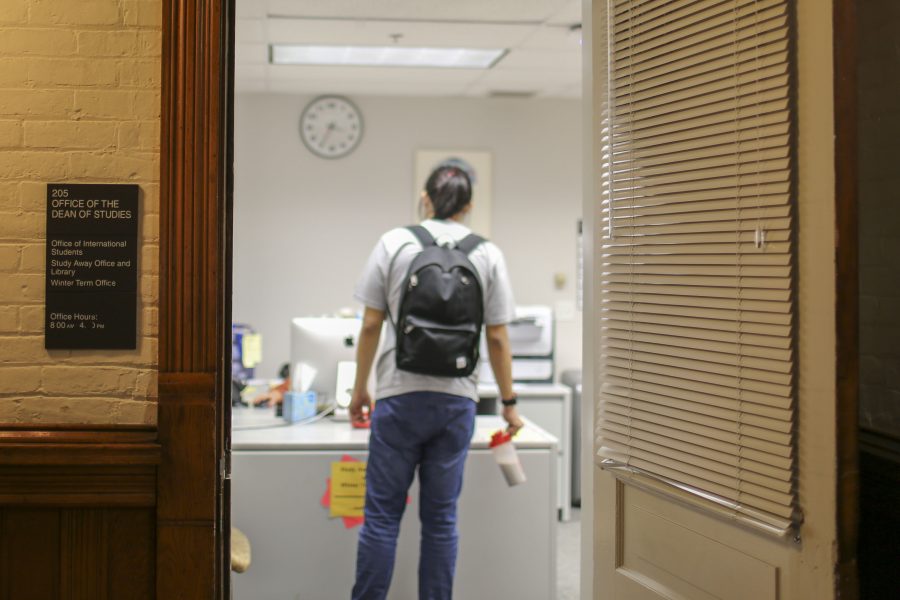College to Eliminate Dean of Studies Office
Photo by Rick Yu, Photo editor
A student talks to the administrative assistant in the Dean of Studies Office. The office will be terminated at the end of the school year.
December 2, 2016
In an effort to consolidate and restructure offices on campus, administrators have decided to eliminate the Dean of Studies Office.
The decision is part of the Strategic Plan’s implementation and efforts to create a more streamlined and helpful advising system.
The Strategic Plan stipulates that the College needs to “adopt the framework of connected learning — an educational model that supports every student in the intentional integration of coursework, advising, mentoring, internships, experiential and applied learning, and personal support throughout their undergraduate careers.”
“I think the feeling coming out of the Strategic Plan was that the faculty wanted to be more directly involved in some of the advising and mentoring functions, and that’s been the focus of a working group that Dean [Timothy] Elgren and Dean [Andrea] Kalyn had established and is now sort of part of the Strategic Plan,” President Marvin Krislov said.
The Dean of Studies Office currently houses a myriad of seemingly unrelated functions, such as coordinating leaves of absences, managing advising and overseeing students’ academic standing and winter term projects. The resulting lack of clarity made communication cumbersome and inefficient, especially for faculty advisors.
“When questions do come up, I often don’t know the answer and I will send o a message to the registrar or to the dean of studies — sometimes to all of them simultaneously — plus a class dean, and hope that someone will be able to answer my question,” said Professor of Comparative American Studies and History Shelley Lee.
To Timothy Elgren, dean of the College of Arts and Sciences, the problem is largely one of not having the right tools.
“If all of my time is spent fumbling through your records and trying to interpret your standing, that’s not a good use of my time,” Elgren said. “But if I have your record readily available and it’s a good, precise record that I know we can depend on when we make your academic plan, that’s great.”
Over the course of the semester, administrators hope to create a new system for advising that provides more consistent and centralized support for students and faculty advisors. While the one-to-one professor-student relationship will remain the same, the technology used and the organizational structure surrounding advising are subject to change in the coming months.
Some of the proposed restructuring includes moving medical-leave functions to the Health Center to better protect privacy and provide more optimized care, as well as having the Winter Term and Study Away offices directly report to the Dean of the College of Arts and Sciences.
However, administrators have yet to determine what will happen to all the staff who work in the department, and that uncertainty has prompted concerns. Diane Lee, interlibrary loan supervisor and first Vice President of the Office and Professional Employees Union, expressed frustration with the lack of transparency in the decision-making process.
“We believe a few senior administrators have plans which they developed without sufficient consultation with faculty, staff or students, and we’re not convinced they understand the impact of those plans on people and services,” Lee wrote in an email to the Review. “We would like to know if the College intends to replace vacancies in that office, or if they intend to do as they have in other areas — eliminate or reduce administrative assistant positions and either transfer the work to A&PS [Arts and Professional Staff ] staff or double the workload of remaining AAs. That has a serious impact not only on the affected employees, but also on faculty and students needing assistance from the office.”
Due to the restrictions in the Oberlin College Office and Professional Employees contract, the College will have a difficult time eliminating or changing any administrative assistant positions, Lee noted.
“Fortunately, our contract has some protections for people whose positions are eliminated or involuntarily reduced,” Lee wrote. “If the College forces employees to take advantage of those rights to continue working, students and faculty could experience disruption of service in other departments.”





















